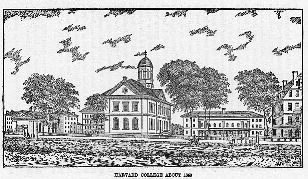James Russell Lowell
III. JAMES RUSSELL LOWELL: 1819-1891.
James Russell Lowell, the youngest of the New England group and the most versatile, was born in Cambridge,
February 22, 1819. Ancestry.
His American ancestry dated from colonial times, and, like Emerson's, was throughout representative of the academic class; his father, grandfather, and great-grandfather were graduates of Harvard College. It was Lowell's grandfather who, in 1780, introduced into the Bill of Rights of the state the clause abolishing slavery in Massachusetts. An uncle was the founder of the Lowell Institute in Boston. The poet's father was pastor of the West Church in that city. Mrs. Lowell, a woman of intensely imaginative mind, a lover of poetry and music, was of Scotch parentage, her father having been a native of the Orkney Islands.
Elmwood.
The home of the Lowells, appropriately known as Elmwood, was situated not far beyond the Craigie house, somewhat off the main avenue of travel, a large mansion, surrounded by trees -- a "bowery loneliness" which drew the bluebirds, orioles, and robins; beyond -- the meadows, a stretch of marsh, and the Charles River, --
"a stripe of nether sky,
Now hid by rounded apple-trees between,
Whose gaps the misplaced sail sweeps bellying by,
Now flickering golden through a woodland screen."1
"Ah, this is a pleasant place; I wonder who lives here, what little boy" -- his father said one day to James, as they returned from a drive and passed through the gate of Elmwood. Within the house were books, Rev. Mr. Lowell's well-selected library, among which the boy browsed knowingly. As a child he was read to sleep from The Faerie Queene, and rehearsed its adventurous episodes to his playmates.
College.
After the first study days had been passed in attendance at a classical school in Cambridge, where
Latin and Greek were the principal branches taught, young Lowell entered Harvard College in 1834 --
two years before Longfellow took up the duties of his professorship. Here Lowell found further opportunity
for wide and varied reading. In his own words, he read "almost everything except the text-books prescribed
by the Faculty." After several whimsical breaches of academic discipline, Lowell, near the close of the
senior year, was "rusticated," being required to make his residence in Concord, there to remain until
Commencement Day. His father and mother were at the time absent in Europe. The young man had
already been elected class-poet, and during his enforced stay in the pleasant village where Emerson
had recently settled, the student-poet worked upon his production. With Emerson, who was then thirty-
five, Lowell now made personal acquaintance, walking and talking with him. One of the events of his
college course had been the delivery of the famous Phi Beta Kappa address by Emerson at the preceding
Commencement in 1837, which had profoundly impressed the minds of the young men who heard it.1
Still this independent youth, who always persisted in thinking for himself, was at this time by no means a
docile disciple. In his class-poem he satirized the transcendentalists along with the abolitionists, although
before many months elapsed he allied himself strenuously with both. The poem, which he was unable
to present in person on class day, was privately printed and distributed among his friends. "The year
Lowell graduated," says Edward Everett Hale, "we were as sure as we are now that in him was first-rate
poetical genius, and that here was to be one of the leaders of the literature of the time."1
The Law vs. Literature.
In his choice of a profession, Lowell selected the law; and in 1840 was admitted to the bar. Lowell's verse received its first potent impulse in his love for Maria White, the sister of one of his classmates, a girl of remarkable beauty and rare mental gifts, herself a poet by nature, and an enthusiast in various humanitarian
| Previous chapter | Back | Home | Email this | Search | Discuss | Bookmark | Next chapter/page |
See our FAQ for more details.